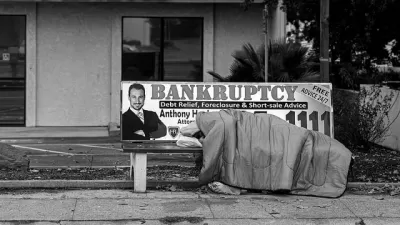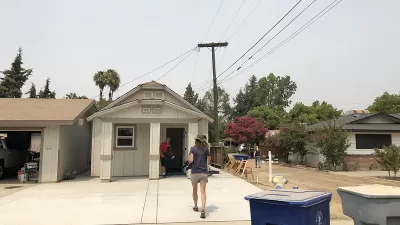Mayor-Elect Steinberg enters City Hall as a leader with a unique opportunity to enact sustainable infill policies he championed in the California Legislature.

Sacramento is a city on the rise. From being ranked the fourth-most hipster city in the nation to the Golden 1 Center opening next month, California's capital city has seen incredible growth and investment in the past three years. As Sacramento continues its resurgence, it welcomes newly elected Mayor Darrell Steinberg to the helm. Steinberg served on the Sacramento City Council, in state Assembly, and was the California Senate Pro Tem from 2008 to 2014.
Steinberg avoided a runoff in November by winning more than 50% of the vote and will take office in December. Laying out his vision in an interview with The Planning Report, Mayor Steinberg shares his plan to reduce homelessness, strengthen the regional economy through building a agricultural-tech hub, and prioritized public transportation and sustainable community strategies. As the author of Senate Bill 375 (Sustainable Communities and Climate Protection Act of 2008) in the California Senate, Steinberg literally wrote the book on how to reduce sprawl and encourage urban infill. As Steinberg explains, SB 375 has "without question changed the planning paradigm in California."
Sacramento's urban core has been one of the major drivers of the rising economy, as young professionals have appreciated moderate rental prices, a strong local farm-to-fork food movement, and local leaders that prioritize biking and walking. Steinberg views his position as an opportunity to build an economy around urban infill, stating:
"SB 375 has helped provide California with an opportunity to change the way we grow into the future. It is an exciting time for Sacramento because this market is driving the need for 10,000 infill units in our Downtown. It wasn’t long ago, before the passage of SB 375, that you would never build market-rate housing downtown, because land prices there were too high and people didn’t want to live there anyway. In the past few months, I’ve been to two openings for market-rate housing complexes in Downtown Sacramento. The demand is there."
Steinberg has also looked to find solutions to homelessness. The author of the Mental Health Services Act (Prop 63), Steinberg partnered with Senate President pro Tem Kevin De Leon this past year to secure a portion of those funds to create a $2 billion housing fund for permanent supportive housing, called the No Place Like Home initiative.
Regarding current urban infill politics, Steinberg weighted in on the contentious process of implementing his Senate Bill 743. As the Governor's Office of Planning Research is implementing SB 743, they are currently in the process of changing the transportation impact metric in CEQA from Level of Service to Vehicle Miles Traveled. As Steinberg explains, this experience is just one of many debates that stakeholders need to have on the way to reducing emissions. Steinberg's goal in SB 743 was to "reduce the friction for the projects that want to see happen: affordable housing, urban infill, and clean energy. It included a number of elements, including reducing the time period for litigation for major, job-creating projects. We cannot address our housing needs and changing cities without reducing this friction."
Read more of Mayor-elect Steinberg's vision for Sacramento in The Planning Report.
FULL STORY: Sacramento Mayor-Elect Darrell Steinberg Shares His Priorities & Agenda

Alabama: Trump Terminates Settlements for Black Communities Harmed By Raw Sewage
Trump deemed the landmark civil rights agreement “illegal DEI and environmental justice policy.”

Study: Maui’s Plan to Convert Vacation Rentals to Long-Term Housing Could Cause Nearly $1 Billion Economic Loss
The plan would reduce visitor accommodation by 25% resulting in 1,900 jobs lost.

Planetizen Federal Action Tracker
A weekly monitor of how Trump’s orders and actions are impacting planners and planning in America.

Wind Energy on the Rise Despite Federal Policy Reversal
The Trump administration is revoking federal support for renewable energy, but demand for new projects continues unabated.

Passengers Flock to Caltrain After Electrification
The new electric trains are running faster and more reliably, leading to strong ridership growth on the Bay Area rail system.

Texas Churches Rally Behind ‘Yes in God’s Back Yard’ Legislation
Religious leaders want the state to reduce zoning regulations to streamline leasing church-owned land to housing developers.
Urban Design for Planners 1: Software Tools
This six-course series explores essential urban design concepts using open source software and equips planners with the tools they need to participate fully in the urban design process.
Planning for Universal Design
Learn the tools for implementing Universal Design in planning regulations.
Caltrans
Smith Gee Studio
Institute for Housing and Urban Development Studies (IHS)
City of Grandview
Harvard GSD Executive Education
Toledo-Lucas County Plan Commissions
Salt Lake City
NYU Wagner Graduate School of Public Service




























